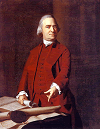Samuel Adams, born on September 27, 1722, in Boston, Massachusetts, was a pivotal figure in American history, known for his influential role in the American Revolution and as one of the Founding Fathers of the United States. Educated at Harvard College, Adams initially pursued various business ventures but soon found his calling in politics.
Adams became deeply involved in the struggle against British colonial rule, emerging as a staunch advocate for colonial rights. He was a master propagandist and a key organizer of resistance against British policies, such as the Stamp Act of 1765 and the Townshend Acts of 1767. His writings and speeches galvanized public opinion and mobilized colonists against British oppression.
Adams played a crucial role in forming the Sons of Liberty, a secret organization that protested British taxation and policies. He was instrumental in orchestrating the Boston Tea Party in 1773, a bold act of defiance that escalated tensions between Britain and the American colonies. As a delegate to the Continental Congress, Adams was a strong proponent of independence and signed the Declaration of Independence in 1776.
Throughout the Revolutionary War, Adams continued to be a leading voice for liberty and republicanism. After the war, he served in various political roles, including as a member of the Massachusetts state senate and as the state's governor. His unwavering commitment to American independence and his efforts in shaping the new nation earned him a lasting legacy.
Samuel Adams passed away on October 2, 1803, in Boston. His contributions to American independence and his relentless advocacy for democratic principles cemented his place as a key figure in the founding of the United States.
|










